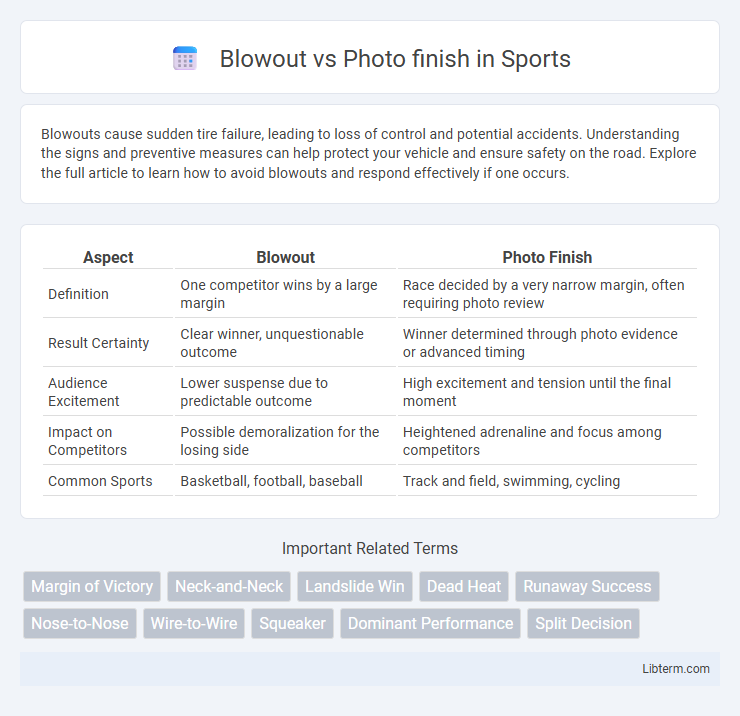Blowouts cause sudden tire failure, leading to loss of control and potential accidents. Understanding the signs and preventive measures can help protect your vehicle and ensure safety on the road. Explore the full article to learn how to avoid blowouts and respond effectively if one occurs.
Table of Comparison
| Aspect | Blowout | Photo Finish |
|---|---|---|
| Definition | One competitor wins by a large margin | Race decided by a very narrow margin, often requiring photo review |
| Result Certainty | Clear winner, unquestionable outcome | Winner determined through photo evidence or advanced timing |
| Audience Excitement | Lower suspense due to predictable outcome | High excitement and tension until the final moment |
| Impact on Competitors | Possible demoralization for the losing side | Heightened adrenaline and focus among competitors |
| Common Sports | Basketball, football, baseball | Track and field, swimming, cycling |
Understanding Blowout and Photo Finish: Key Differences
Blowout refers to a race outcome where a competitor wins by a large and decisive margin, often indicating dominant performance, while a photo finish occurs when multiple competitors cross the finish line so closely that the winner must be determined through detailed photo analysis. Understanding the key differences involves recognizing that blowouts highlight clear superiority in speed or endurance, whereas photo finishes emphasize the importance of precision timing and technology in resolving extremely close competitions. Both scenarios impact race strategies, athlete training, and officiating standards by showcasing contrasting degrees of competitiveness and result certainty.
The Thrill of a Photo Finish Explained
Photo finishes in sports captivate fans by capturing the exact moment two competitors cross the finish line simultaneously, offering an unparalleled rush of suspense and excitement. Unlike blowouts where one athlete dominates clearly, photo finishes hinge on milliseconds, showcasing the intense competitiveness and skill involved. High-speed cameras and advanced timing systems enhance the precision of results, turning close races into unforgettable, edge-of-your-seat moments.
Blowouts: Definition and Impact on Competitions
Blowouts occur when one competitor or team overwhelmingly dominates another, resulting in a lopsided final score that significantly impacts competition dynamics. This type of decisive victory can affect rankings, morale, and future match strategies by highlighting disparities in skill or preparedness. Unlike photo finishes, which emphasize closely contested outcomes, blowouts underscore clear superiority and often prompt reevaluation of training or team composition.
Historical Examples of Memorable Blowouts
Historical blowouts in sports showcase staggering score disparities that captivate fans, such as the 1916 Cumberland vs. Georgia Tech football game where Georgia Tech triumphed 222-0, marking one of the most lopsided victories in college football history. Another iconic blowout occurred in the 1985 NBA Playoffs when the Los Angeles Lakers defeated the Dallas Mavericks 150-73, reflecting dominant team performance and strategic superiority. These monumental blowouts highlight moments of overwhelming athletic dominance that contrast sharply with the tight suspense of photo finishes.
Iconic Photo Finishes in Sports History
Iconic photo finishes in sports history have defined legendary moments by capturing the milliseconds that determined victory, contrasting sharply with blowouts where the outcome is clear and uncontested. These photo finishes immortalize the intense competition and razor-thin margins seen in events like the 1948 London Olympics 100m sprint and the 1972 Munich Olympic swimming final. Such moments highlight the precision of modern technology in sports, emphasizing the excitement and unpredictability inherent in elite competition.
Psychological Effects on Competitors
Blowout losses often lead to severe psychological impacts such as diminished self-confidence, increased anxiety, and heightened risk of burnout among competitors. Photo finishes, by contrast, tend to amplify adrenaline and motivation, fostering resilience and a heightened competitive drive due to the intense pressure and narrow margins. Understanding these psychological effects can inform coaching strategies that better support athletes' mental health and performance optimization.
Audience Engagement: Blowout vs Photo Finish
Blowout games often result in lower audience engagement as the outcome becomes predictable early, reducing viewers' emotional investment. Photo finish events boost audience excitement and engagement by maintaining suspense until the very last moment, encouraging real-time interaction and heightened attention. Sports broadcasters and marketers leverage photo finishes to maximize viewership and social media buzz, driving stronger fan participation.
Strategies Leading to Blowouts
Blowouts in sports occur when one team dominates the game through aggressive offensive strategies, exploiting defensive weaknesses, and maintaining high possession or scoring efficiency. Teams often implement fast-paced attacks, deep defensive lines, and relentless pressure to overwhelm opponents quickly. Tactical adjustments exploiting mismatches and capitalizing on early momentum frequently lead to these lopsided victories.
Technologies Enhancing Photo Finish Accuracy
Advanced digital imaging and high-speed cameras significantly enhance photo finish accuracy by capturing thousands of frames per second, ensuring precise detection of finish line positions in racing events. Integrated timing systems with laser sensors and RFID chips synchronize with these images to provide real-time data verification and reduce human error. Machine learning algorithms further analyze photo finish images to distinguish athletes' exact crossing moments, surpassing traditional blowout methods in reliability and fairness.
Which is More Exciting? Blowout vs Photo Finish
Blowouts deliver excitement through dominant performances and overwhelming victories, showcasing clear superiority and strategic execution. Photo finishes captivate audiences with intense suspense and razor-thin margins, highlighting the unpredictability and competitive spirit of the race. While blowouts emphasize dominance, photo finishes create unparalleled tension, making the latter generally more thrilling for spectators craving edge-of-the-seat excitement.
Blowout Infographic

 libterm.com
libterm.com